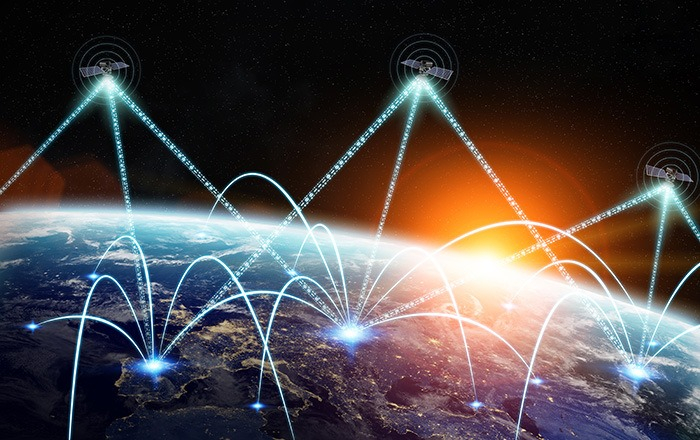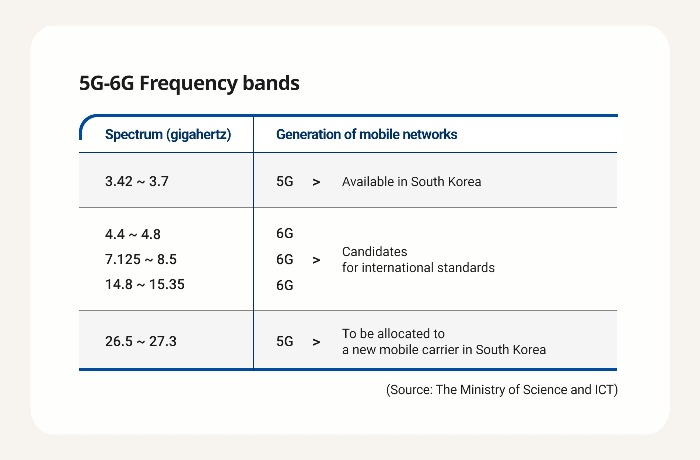Korea’s 6G frequency bands picked as standard candidates
An international telecommunications body has allocated new frequency bands to allow for high-speed internet on aircraft and ships
By Dec 18, 2023 (Gmt+09:00)
LG Chem to sell water filter business to Glenwood PE for $692 million


KT&G eyes overseas M&A after rejecting activist fund's offer


Kyobo Life poised to buy Japan’s SBI Group-owned savings bank


StockX in merger talks with Naver’s online reseller Kream


Meritz backs half of ex-manager’s $210 mn hedge fund



The country's three frequency ranges beat 23 spectrums offered by other countries at the World Radiocommunication Conference (WRC), hosted by the International Telecommunication Union (ITU) under the United Nations.
The conference took place in Dubai, the United Arab Emirates, from Nov. 20 to Dec. 15.
South Korea had proposed four 6G frequency ranges and three of them were selected as global stand candidates: 4.4-4.8 gigahertz (GHz); 7.125-8.5GHz; and 14.8-15.35GHz.
Last week, the Economic Times reported the WRC reached a "historic agreement" to open a new spectrum band for 4G, 5G and 6G mobile technologies, citing India's telecom industry authorities.

"As the 6G frequency bands we had proposed were selected as final candidates, there is no need to adjust our 6G business plans,” said an official from the Ministry of Science and ICT.
The WRC, held every three to four years, oversees broadband communication technologies and regulations, as well as radio frequency band allocations.
About 4,000 delegates from 163 countries participated in the conference, including those from South Korea’s science ministry and defense ministry and Samsung Electronics Co.

INTERNET ON AIRCRAFT
Notably at the meeting, the WRC allocated a new range of spectrums for low-orbit satellite-based Earth Station In-Motion (ESIM) services at an altitude of 400 to 600 kilometers.
Under the new frequency bands, internet access will be available on ships and airplanes at a speed of 500 megabits per second, similar to that of fourth-generation mobile communications.
Currently, satellite communications for aviation and ships are based mainly on geostationary satellites, floating at an altitude of 36,000 km, so there were frequent interruptions.
FOURTH MOBILE CARRIER
Meanwhile, South Korea’s science ministry is receiving applications for the 5G frequency range in the 28 GHz band by the Dec. 19 deadline to allocate it to a new mobile carrier.
Three domestic telecommunication companies -- SK Telecom Co., KT Corp. and LG Uplus Corp. -- have given up the frequency spectrum.
Write to Ju-Hyun Lee and Hae-Sung Lee at deep@hankyung.com
Yeonhee Kim edited this article.
-
 Tech, Media & TelecomSK Telecom develops reconfigurable surface tech for 6G transmission
Tech, Media & TelecomSK Telecom develops reconfigurable surface tech for 6G transmissionFeb 09, 2023 (Gmt+09:00)
1 Min read -
 Corporate investmentSamsung to invest $355 billion in chip, biotech, 6G over five years
Corporate investmentSamsung to invest $355 billion in chip, biotech, 6G over five yearsMay 24, 2022 (Gmt+09:00)
3 Min read -
 Tech, Media & TelecomSamsung Elec. proposes global research for 6G frequencies
Tech, Media & TelecomSamsung Elec. proposes global research for 6G frequenciesMay 09, 2022 (Gmt+09:00)
1 Min read -
 Mobile networksLG ramps up 6G development for first mover advantage
Mobile networksLG ramps up 6G development for first mover advantageFeb 18, 2022 (Gmt+09:00)
3 Min read -
 Mobile networksLG Elec takes quantum leap in 6G with THz band breakthrough
Mobile networksLG Elec takes quantum leap in 6G with THz band breakthroughAug 20, 2021 (Gmt+09:00)
3 Min read -
 Mobile networksSamsung, LG take major steps forward in 6G commercialization
Mobile networksSamsung, LG take major steps forward in 6G commercializationJun 17, 2021 (Gmt+09:00)
4 Min read


